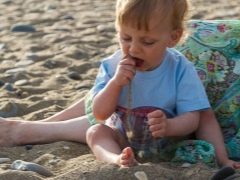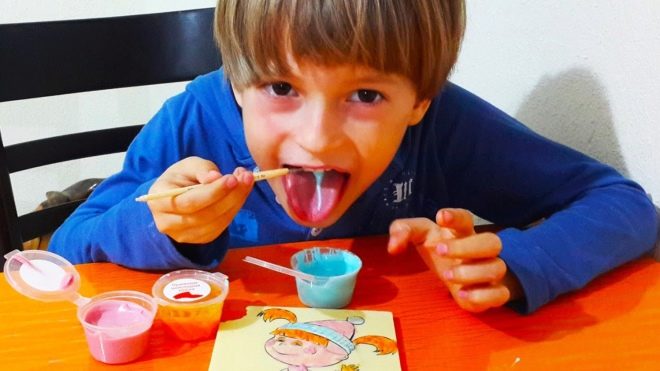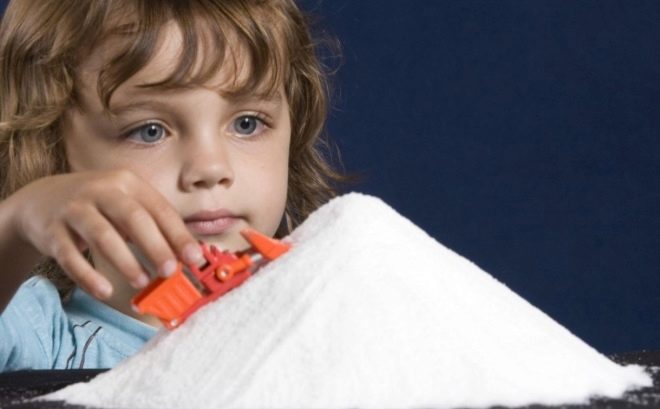Why does a child eat something that is not accepted?
Sometimes parents are confronted with strange situations: a child begins to feast on with chalk, eats sand, lands from a flowerpot, eats snow with great pleasure and licks sulfur from matches. The first thing that comes to mind is a consequence of the deficiency of some specific substances or vitamins in his body. But this behavior does not always indicate a lack of beneficial micro and macro elements in the diet.
What's happening?
There is something that is not usually accepted; children start for two reasons. First of all - from simple children's curiosity. Taste buds are an important cognitive tool for a child, and the baby tastes and tastes the world as much as its upbringing, living conditions and parents allow it. But one thing is to try the inedible taste once or a couple of times, and quite another to systematically eat what is unsuitable for food.
If the child is constantly eating something that is not accepted, be sure to consult with your doctor. It is possible that he develops allotriophagy - an eating disorder in which a person eats inedible things.
In the adult population of the planet, this phenomenon is relatively rare - the fact that only 1% of adult men and women eat inedible regularly. But children are different. Up to 15% of preschool children suffer from allotriophagy, and at the age of 4 years up to 32% of children are prone to eating inedible.
Whether it is dangerous depends on what the child prefers. Chalk will not cause harm to health, but glass, sand, small metal objects can pose a serious danger to the life and health of the crumbs.
Allotriophagia can be of two types: pathological, peculiar to feeble-minded, mentally ill people who simply do not realize that they are trying to chew, and also children - physiological. It flows against the background of the perversion of taste perceptions, while the child is mentally healthy and other oddities in his behavior and development is not observed.
In most cases, the child eats the inedible in addition to its basic, completely normal diet.. And only in rare cases, allotriophagy is total in nature, when a baby replaces normal foods with paint, sand, clay, wood, paper, or something that he has to taste, refusing to eat ordinary foods.
Why is he doing this?
This is the main question that torments parents. It should be noted that in childhood it is almost impossible to establish the exact causes of allotriophagy.
Particularly persistent parents can be called a few common root causes.
Difficult family relationships. Psychiatrists believe that this factor is decisive. Too demanding upbringing, humiliation of the child, lack of love and care, neglect, domestic violence, including psychological, lack of toys, attention may well provoke a eating disorder.
Emotional and psychological trauma. Usually, the first meal with clips or candy wrappers falls on a period of certain events that caused a strong emotional shock in a child. Thus, allotriophagy can develop in a child at the epicenter of hostilities and natural disasters, after the death of a loved one, after violence.
The specific lack of certain amino acids, macronutrients, vitamins. For example, the desire to eat chalk is associated with a lack of calcium, and sulfur from matches is unknowingly chosen by a child if there is not enough sulfur and phosphorus in his body.
Hormonal disorders. For this reason, strangeness and food "fads" occur in pregnant women. And it is the imbalance of hormones that causes food distortion in adolescents. But even in babies, the endocrine background may be impaired in terms of the balance of hormones that have an influence on smell and tastes.
Mental Disorders. Allotriophagy usually occurs in children with schizophrenia, severe mental retardation, oligophrenia, autism.
What may not be enough?
If a child eats dirt or soil from a flower pot, it can be assumed that he has a lack of iron in the body. Need to do a blood test, to assess the level of hemoglobin and find out exactly whether the baby has anemia.
By itself, eating the soil, clay is dangerous, because it is in this environment that the eggs of many parasites, cysts, and bacteria that can cause serious illnesses are best preserved.
The desire to nibble icicles, by the way, is also often associated with a lack of iron. The systemic poor nutrition, unbalanced, inadequate causes the desire to gnaw wood, matches, coal. Baby soap starts to eat not only because of its attractive smell, but also because of the lack of zinc in the body. And salt absorbs the child, probably because of the lack of sodium. Hair is children begin with a lack of amino acids.
What to do?
Before you start stuffing your child with shock doses of a substance that, in your parent's opinion, he is not enough, you should visit a doctor. You can contact the most ordinary pediatrician. This specialist will prescribe the necessary examination. - general and biochemical blood test. Their results will help you to understand if your baby needs iron, calcium, potassium, magnesium, zinc, selenium and other substances.
If the tests are good, and the child himself seems mentally healthy to the doctor, it may be recommended to have a blood test for a hormonal profile, as well as to visit a child psychologist or psychotherapist to help find and eliminate the possible psychogenic causes of eating disorders.
For the treatment of allotriophagia, no special drugs have been created. If tests show a lack of certain vitamins and elements, it is recommended that either a complex multivitamin preparation, or a specific vitamin or mineral substance. In case of hormonal imbalance, treatment is prescribed by the endocrinologist and it consists in eliminating the deficiency or excess of certain hormones.
Treatment of severe allotriophagy consists in providing psychotherapeutic assistance to the child., which will include family activities, art therapy, adolescents - hypnotherapy.
It is noteworthy that a new toy sometimes helps to cope with the problem. - game variety reduces the child's need to eat the inedible. When allotriophagy in mentally ill children is treated by a psychiatrist.
Dr. Komarovsky and his colleagues urge parents to start by trying to change the approach to shaping the child’s diet, paying attention to what he is doing and what he needs.
You will learn more about the correct formation of the child’s diet by watching the following video.

















